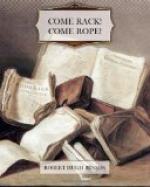There, then, was the situation; and Mr. Anthony had, plainly, crossed swords this evening on the point.
“The Jesuit is too simple,” he said suddenly, as he strode about. “I think—” He broke off.
His sister smiled upon him placidly.
“You are too hot, Anthony,” she said.
The man turned sharply towards her.
“All the praying in the world,” he said, “has not saved us so far. It seems to me time—”
“Perhaps our Lord would not have us saved,” she said; “as you mean it.”
III
It was not until Christmas Eve that Marjorie went to St. Paul’s, for all that it was so close. But the days were taken up with the visitors; a hundred matters had to be arranged; for it was decided that before the New Year all were to be dispersed. Captain Fortescue and Robin were to leave again for the Continent on the day following Christmas Day itself.
Marjorie made acquaintance during these days with more than one meeting-place of the Catholics in London. One was a quiet little house near St. Bartholomew’s-the-Great, where a widow had three or four sets of lodgings, occupied frequently by priests and by other Catholics, who were best out of sight; and it was here that mass was to be said on Christmas Day. Another was in the Spanish Embassy; and here, to her joy, she looked openly upon a chapel of her faith, and from the gallery adored her Lord in the tabernacle. But even this was accomplished with an air of uneasiness in those round her; the Spanish priest who took them in walked quickly and interrupted them before they were done, and seemed glad to see the last of them. It was explained to Marjorie that the ambassador did not wish to give causeless offence to the Protestant court.
And now, on Christmas Eve, Robin, Anthony and the two ladies entered the Cathedral as dusk was falling—first passing through the burial-ground, over the wall of which leaned the rows of houses in whose windows lights were beginning to burn.
The very dimness of the air made the enormous heights of the great church more impressive. Before them stretched the long nave, over seven hundred feet from end to end; from floor to roof the eye travelled up the bunches of slender pillars to the dark ceiling, newly restored after the fire, a hundred and fifty feet. The tall windows on either side, and the clerestory lights above, glimmered faintly in the darkening light.
But to the Catholic eyes that looked on it the desolation was more apparent than the splendour. There were plenty of people here, indeed: groups moved up and down, talking, directing themselves more and more towards the exits, as the night was coming on and the church would be closed presently; in one aisle a man was talking aloud, as if lecturing, with a crowd of heads about him. In another a number of soberly dressed men were putting up their papers and ink on




